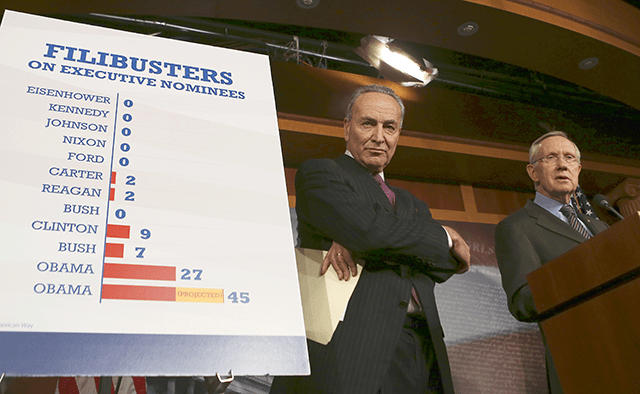In November 1942, with the allies beginning to turn the tide in World War II, Winston Churchill said: “Now this is not the end. It is not even the beginning of the end. But it is, perhaps, the end of the beginning.”
I thought of that as I joined Senate Majority Leader Harry Reid, champions of Senate rules reform like Senators Tom Harkin (D-IA), Jeff Merkley (D-OR), and Tom Udall (D-NM), and scores of other activists at a news conference right after Senate Democrats voted to change the rules to allow a simple majority vote on executive branch nominees and almost all judicial nominees.
| There needs to be another change—not to an outdated rule, but to an outdated tradition known as the “blue slip.” |
This was not a decision made easily or taken lightly. Democratic Senators voting for the rule change had no choice. The Republican minority had turned the existing rules into weapons of mass obstruction. Most recently, they acknowledged that they had no grounds to oppose on the merits President Barack Obama’s supremely-qualified nominees for the D.C. Circuit Court of Appeals. But they filibustered those nominees anyway.
This change in the rules is the only way to ensure that the Senate can put the well-being of the American people ahead of the political interests of an extremist minority.
But the new filibuster rule does not guarantee that qualified nominees to the federal bench will be confirmed, and changing the filibuster rule should not be the end of Senate reform. When the Senate reconvenes this month, more reforms are needed if we are to take full advantage of new opportunities.
For starters, there needs to be another change—not to an outdated rule, but to an outdated tradition known as the “blue slip.”
Whenever a nominee to the federal bench is put forward by the president, the Senate Judiciary Committee sends a letter (it’s actually blue) asking the home-state senators for approval or disapproval. Under the current custom, if either senator says no, the nomination dies. That gives any senator a de facto veto over any nominee from his or her state. In fact, any senator who wants to block a nominee can employ a passive-aggressive approach and simply not return the blue slip.
It is no surprise that more than 80 percent of all the judgeships for which there is no nominee are in states with at least one Republican senator.
We are pleased that the president has picked up the pace of nominations during his second term. And, as noted above, the blame for vacancies without nominations often lies with Republican Senators. Ending the blue slip tradition will create the opportunity to fill every seat.
It also creates an opportunity to broaden professional diversity on the bench. The president has done an outstanding job in promoting diversity on the basis of race, ethnicity, gender and sexual orientation. But more than 80 percent of his nominees have been either corporate attorneys or prosecutors—or both. Prosecutors outnumber public defenders by more than 3-to-1, and fewer than 4 percent of Obama’s nominees have practiced as attorneys for public-interest organizations.
All of us are profoundly shaped by our personal experiences. Our view of the world is filtered through what we see and hear in our day-to-day lives. Achieving justice requires that the federal bench include judges who bring to their jobs a wide variety of experiences in both their personal and professional lives.
If Obama begins appointing more public-interest lawyers to the federal bench, it could have a ripple effect well beyond the judiciary. As The Huffington Post noted, “Progressives who hoped one day to work as federal judges no longer have to worry that working as a general counsel for Planned Parenthood or the Sierra Club will automatically disqualify them.” And absent the fear of endless stalling by obstructionist senators, more qualified candidates will apply for federal judgeships.
Reform of the Senate’s procedures was a welcome victory, but no one should think it ended anything. It was only the end of the beginning. The fight goes on, as it should. The stakes are huge. All of us must keep the pressure on.
Nan Aron is President of Alliance for Justice, a Washington, D.C.-based national association of over 100 organizations, representing a broad array of groups committed to progressive values and the creation of an equitable, just, and free society.







0 Comments